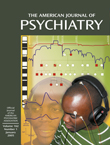Diminished Suppression of the P50 Auditory Evoked Potential in Bipolar Disorder Subjects With a History of Psychosis
Abstract
OBJECTIVE: People with schizophrenia, schizoaffective disorder, and bipolar illness share clinical symptoms, biological findings, and genetic susceptibility. Diminished suppression of the P50 auditory evoked potential is a phenotype used in studies of genetic susceptibility in schizophrenia. In patients with acute mania, this inhibitory deficit has been correlated with severity of clinical symptoms. This study addresses whether diminished P50 auditory evoked potential suppression represents a phenotype associated with psychosis in bipolar illness. METHOD: The P50 auditory evoked potential response to paired stimuli was measured in 64 subjects with bipolar illness. The Structured Clinical Interview for DSM-IV and a life chart determined diagnosis. The Beck Depression Inventory, Young Mania Rating Scale, and the Positive and Negative Syndrome Scale measured severity of current illness. Groups were compared with previously collected data from 36 schizophrenia patients and 42 healthy subjects. RESULTS: P50 suppression significantly differed between bipolar disorder patients with a lifetime history of psychosis and healthy subjects. P50 suppression in bipolar disorder patients without a history of psychosis did not differ from that of the healthy subjects. Severity of current symptoms did not correlate with P50 suppression. CONCLUSIONS: A longitudinal history of psychosis in subjects with bipolar illness was associated with diminished suppression of the P50 auditory evoked potential. This deficit may represent a common physiological mechanism associated with the vulnerability to psychosis in people with bipolar illness as well as in people with schizophrenia.



